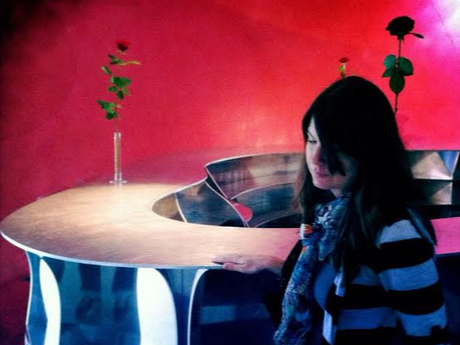In Their Own Words
Monica Fambrough on “Lucidity”

Lucidity
Is that my mind
or a bug crawling
down the leg
of the table
Sliding down
like a Percocet
a nurse pushes
to me across
a tray
She always
has a packet
of saltines
or she doesn’t
and you puke your guts
out an hour
later
Later
we will
watch the sun
set fire to the hair
of a woodpecker
turning his silhouette
to ash
from our
porch
Or oh
he’s just
gone around
the back
of the tree
actually
we are all
still here
From Blue Transfer (Oversound, 2020). Reprinted with the permission of the poet.
On “Lucidity”
In 2017 (after this poem was written), I was able to experience the “totality” of the solar eclipse in the mountains of North Georgia. I remember how eerily still the darkness was, as the sky darkened to purple and the crickets chirped. Like many people, my mind immediately turned to what this must have felt like to my prehistoric ancestors, who had no scientific explanation for it and might have felt the world was ending. Then suddenly, the sun returned. The sky was blue again.
“Lucidity” is not about loss. But it is about confusion, fear, and survival. When you are trapped, in your house, in a hospital, in a sick body, the point of release is the point at which everything is alight. Small things have a new intensity. Sometimes there is clarity, sometimes more murk. This poem is written from that moment, just after a bleakness: the first big intake of breath. It is coming up for air. Time is shifty, as the speaker insists on the present, but it contains a sort of flash-forward nestled in a flashback. It seemed like the right poem for the moment we are collectively in. We are all wondering when this will be over, and how we will feel when it is.
This poem is a difficult read for me now, as it ends with a kind of hopefulness I know is false. The woodpecker’s eclipse is not deadly; a virus is. We know not everyone survives. We all want to be here still, but we are tired of being still. “Lucidity” also points out the folly of trying to ascribe meaning to an experience you can’t, and weren’t meant to, understand. Your perception is not trustworthy. The woodpecker was never on fire, but its disappearance is what allows us to notice that something has changed. We are newly aware of the continuous present, breathing the impossibly thin air between despair and gratitude.



